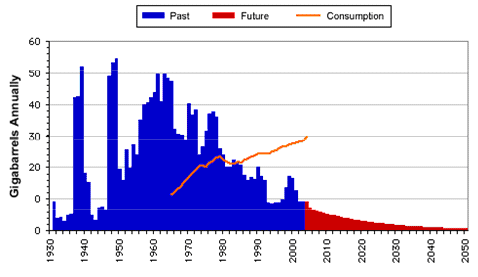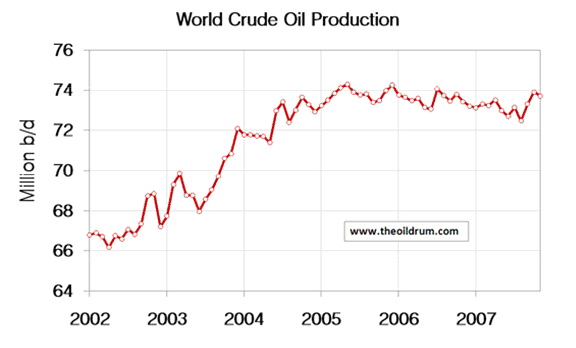During the past decade a growing chorus of energy analysts has warned of the approach of “Peak Oil,” the time when the global rate of extraction of petroleum will reach a maximum and begin its inevitable decline. While there is some dispute as to when it will occur, there is none as to whether. The global peak is merely the cumulative result of production peaks in individual oilfields and in whole oil-producing nations.
The most famous national peak occurred in the US in 1970. While at one time the US was the world’s foremost oil exporting nation, it is today the world’s foremost importer.
.jpg)
Chart 1: US production profile
US oil history helps us evaluate the prospects for delaying the global peak. After 1970, exploration efforts succeeded in identifying two enormous new American oil provinces—the North Slope of Alaska and the Gulf of Mexico. During this period, other kinds of liquid fuels began to supplement crude. Also, improvements in oil recovery technology helped to increase the proportion of the oil in existing fields able to be extracted. These are the strategies (exploration, substitution, and technological improvements) that the oil producers are relying on to delay the global production peak. In the US, each of these strategies made a difference—but not enough to reverse, for more than a year or two now and then, the overall 37-year trend of declining production.
How near is the global peak? Today most oil-producing nations are seeing reduced output. In some instances, these declines are occurring because of lack of investment in production technology or domestic political problems. But in most instances the decline results from factors of geology. And so as years go by there are fewer nations in the category of oil exporters and more nations in the category of oil importers.
Meanwhile global rates of discovery of new oilfields have been declining since 1964.

Chart 2: discoveries trend (Source: ASPO)
Clearly the timing of the global peak is crucial. If it were to happen soon, the consequences would be devastating. Oil has become the world’s foremost energy resource. There is no ready substitute, and decades will be required to wean societies from it.
1. How are the forecasts holding up?
Most forecasts for the global peak fall within the decade from 2005 to 2015. However, a prominent energy advising and analysis firm (Cambridge Energy Research Associates, or CERA) has issued a report foreseeing no peak before 2030.[1]
According to the International energy Agency, the monthly average for daily world production rates for crude oil achieved 74.3 Mb/d in May 2005; that figure has not been equaled since. The last month for which totals have been published is November 2008, which saw average daily production of about 73.17 Mb/d.

Chart 3. Global crude oil production to April 2007. Source: IEA
Meanwhile, oil prices have soared from $12 a barrel in 1998 to over $100 today.
Even if below-ground constraints to the current global supply of oil can potentially be temporarily overcome, above-ground factors (like shortages of drilling rigs and trained personnel) may conspire to keep that new production from appearing fast enough or in sufficient quantity. New production, when it finally does come on-stream, must meet new demand while offsetting accumulating and accelerating declines from existing fields—so delays make the latter problem much harder to solve.
2. What might happen in the next decades absent policies to address Peak Oil?
The likely consequences of Peak Oil have been analyzed at some length in the report, “Peaking of World Oil Production: Impacts, Mitigation, and Risk Management,” commissioned for the US Department of Energy and published in 2005.[2] That report forecast “unprecedented” social, economic, and political impacts if efforts are not undertaken, at a “crash program” scale, and beginning at least a decade in advance of the peak, to reduce demand for oil and initiate the large-scale production of alternative fuels.
High prices and actual shortages will dramatically impact national economies in several important ways. The global transport system is almost entirely dependent on oil—not just private passenger automobiles, but trucks, ships, diesel locomotives, and the entire passenger and freight airline industry. High fuel prices will thus impact entire economies as travel becomes more expensive and manufacturers and retailers are forced to absorb higher transport costs.
Conventional industrial agriculture is also overwhelmingly dependent on oil. Modern farm machinery runs on petroleum products, and oil provides the feedstock for making cheap pesticides. With the global proliferation of the industrial-chemical agriculture system, the products of that system are now also traded globally, enabling regions to host human populations larger than local resources alone could support. Those systems of global distribution and trade also rely on oil. High fuel prices and fuel shortages will therefore translate to higher food prices and could even cause food shortages.
A small but crucial portion of oil consumed globally goes into the making of plastics and chemicals. Future oil supply problems will affect the entire chain of industrial products that incorporate petrochemicals.
Economic impacts to transport, trade, manufacturing, and agriculture will in turn lead to internal social tensions within importing countries. In exporting countries the increasing value of remaining oil reserves will exacerbate rivalries between political factions vying to control this source of wealth. Also, increased competition between consuming nations for control of export flows, and between importing nations and exporters over contracts and pipelines, may lead to international conflict.
3. How is the world responding?
In 1998, policy makers had virtually no awareness of Peak Oil as an issue. Now there are Peak Oil groups within the US Congress and the British Parliament, and individual members of government in many other countries are keenly aware of the situation. Government reports have been issued in several nations.[3] Sweden has made a national commitment to drastically reduce its petroleum dependence by 2020.[4] Cities such as Portland, Oregon, and Oakland, California have undertaken assessments of petroleum supply vulnerabilities and begun efforts to reduce their exposure.[5] A few Non-Governmental Organizations (NGOs) have been formed for the purpose of alerting government and helping develop policy responses—notably, the Association for the Study of Peak Oil and Gas (ASPO), and the Post Carbon Institute.[6] Grass-roots efforts in several have resulted in the creation of “Relocalization Networks” and “Transition Towns” wherein ordinary citizens participate in the development of local strategies to deal with the likely consequences of Peak Oil.[7] Unfortunately, this response is woefully insufficient given the scale of the challenge.
4. What would be a sufficient response?
One way to avert or ameliorate the impacts of Peak Oil would be to implement a global agreement to proactively, cooperatively reduce the use of oil (effectively, a reduction in demand) ahead of actual production declines. This would reduce price volatility, aid with preparation and planning, and reduce international competition for remaining supplies. A proposal along these lines was the subject of a book by the present author (The Oil Depletion Protocol: A Plan to Avert Oil Wars, Terrorism and Economic Collapse).[8]
In order to enlist public support for such efforts, governments would need to devote significant resources to public education campaigns. In addition, planning and substantial public investment would be needed in three critical areas: transportation, agriculture, and chemicals industries.
Transportation: Nations and localities will need to prioritize efforts, determining which policies will save the most oil, and which will be the cheapest and quickest to implement. Four primary strategic areas include:
1. Design to reduce the need for transportation (through strategies to localize production and distribution of goods including food, as well as to design or redesign urban areas for density and diversity)
2. Promote alternatives to the private automobile and to air- and truck-based freight transport
3. Promote electric cars and trucks (since electric motors are far more efficient than internal combustion engines)
4. Promote alternative fuels for vehicles.
Agriculture: Here there are two primary categories of strategies:
1. Maximize local production of food in order to reduce the vulnerability implied by a fossil-fuel based food delivery system
2. Promote forms of agriculture that rely on fewer fossil-fuel inputs
Plastics and Chemicals: Again there are two main strategic options:
1. Identify alternative materials made from renewable sources to replace petrochemical-based materials
2. Devise ways to reduce the amount of materials required and consumed
Fossil fuels have delivered enormous economic benefits to modern societies, but we are now becoming aware of the burgeoning costs of our dependence on these fuels. The human community’s central task for the coming decades must be the undoing of its dependence on oil, coal, and natural gas in order to deal with the twin crises of resource depletion and climate chaos. It is surely fair to say that fossil fuel dependency constitutes a systemic problem of a kind and scale that no society has ever had to address before. If we are to deal with this challenge successfully, we must engage in systemic thinking that leads to sustained, bold action.
Richard Heinberg is a Senior Fellow of Post Carbon Institute, and author of three books on oil depletion including The Party’s Over: Oil, War and the Fate of Industrial Societies. He lectures internationally on the subject and contributes a monthly column to The Ecologist magazine.
[1]See, for example, this press release from CERA, “Peak Oil Theory – “World Running Out of Oil Soon” – Is Faulty; Could Distort Policy & Energy Debate,” November 14, 2006 www.cera.com/aspx/cda/public1/news/pressReleases/pressReleaseDetails.aspx?CID=8444
[3]See, for example, US Government Accountability Office, “Crude Oil: Uncertainty about Future Oil Supply Makes It Important to Develop a Strategy for Addressing a Peak and Decline in Oil Production” (February 2007) www.gao.gov/new.items/d07283.pdf
Further Reading on E-International Relations
- Oil Power Politics amidst a Global Pandemic
- Opinion – Compromising US Energy Security for International Oil Market Stability
- Oil During COVID-19: Essential Service or Subsidized Resource?
- Developing Global Champions: Why National Oil Companies Expand Abroad
- Climate Justice from Theory to Practice: The Responsibility and Duties of the Oil Industry
- The Boom of Guyana’s Oil Industry: Opportunities and Challenges of the New Petrostate